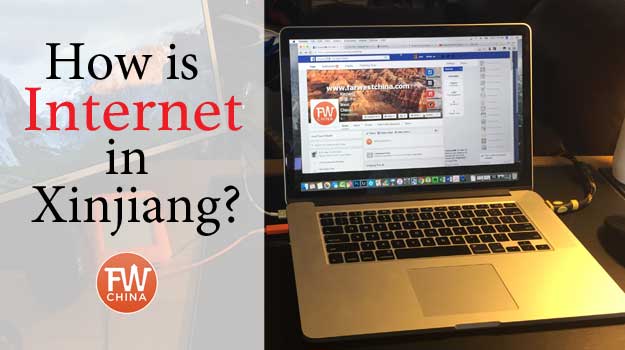The TRUTH about Xinjiang’s Internet Situation
Today marks five long months since communication was severely cut here in the province of Xinjiang.
With the exception of two short trips outside the province during this time, my wife and I have had to sit here and endure a frustrating feeling that we are now living in the stone ages. Still, the information that does find its way to my computer indicates that most people don’t have a complete understanding of this communication blackout.
- How much information is really getting into and out of Xinjiang?
- Is the internet completely cut or just partially?
- If so, how am I updating this blog while still living in Xinjiang?
And the question on everybody’s mind who has any concern about Xinjiang: when will they turn the internet back on?
What Internet is Available within Xinjiang?
The most common misunderstanding I run into with anybody outside the province is the idea that we have no internet whatsoever. Although true in some ways (all email, Skype, and IM have vanished), the statement is bit misleading.
While any internet content, especially for English-speakers, is extremely limited, there is plenty still available to be found in Chinese. It seems to me that the government has basically cut the cord to content that is hosted outside the province, but anything within the province is accessible.
So what does that leave us with?
- Local government websites: All Xinjiang government websites (such as this one for Urumqi) are viewable and are kept up-to-date as normal. In keeping with my theory about where the content is served, though, no government websites from cities like Beijing or Shanghai are available.
- Local News Sites: Popular news portals such as Tianshannet or iyaxin are available and offer both national and international news (in Chinese). The only English-language news site I’ve seen is the Tianshannet-affiliated AboutXinjiang. National sites like CCTV can’t be viewed and international sites are obviously not available.
- Movie Sites: No, I’m not talking about YouTube but rather a series of city-based sites that offer movies for online viewing (legality questionable). You have to register as a citizen of that city before you can actually view the movie, though.
- Limited Shopping: Taobao, the Chinese version of eBay, is available only on a provincial level, meaning that you can only buy Xinjiang stuff from Xinjiang stores. Needless to say, the selection is pretty pathetic.
- Flash Games: All of the major online games have been cut which has led to the rise of a sad assortment of flash game sites. Various portals offer these games but none of them that I have seen offer online multi-player support.
Is it Possible to Get Access to Internet?
While planning for travel on the October holiday this year I was advised by my school and the local security bureau to stay put for the holiday. I couldn’t believe it. I politely went to the police station and had a conversation with the highest official who would talk to me.
I explained to him that because of bank issues, family communication, and general sanity I needed to get on the internet. I needed him to either allow me online or allow me to leave.
First of all, he explained, there was a computer in the security office that had full internet access, but this IP was strictly for monitoring activity in the city. No surprise there, I guess, although I wished he would have let me see this sacred computer.
My second option was to leave the province – and he gave me the permission to do so.
But his third option was what surprised me. Individual IP’s, according to this officer, could be opened up with the appropriate permission. This permission, however, had to be granted at three different levels: city, province, and national. And all of them had to be applied for in person. Apparently this is what companies have to do who require online activity for business.
So it is possible to open up the internet, but it’s a difficult and probably impossible for individuals. Which begs the question: “How are you getting on the internet?”
If I told you that, I’d have to kill you, but suffice it to say that the foreigner network here has set up and passed along a number of different work-arounds. Those which get leaked get plugged…so my lips are shut.
When Will the Internet Re-Open?
Here is the million-dollar question. If you ask 10 different people in Urumqi when the internet should turn back on you’re likely to get 10 different answers. The list ranges from the 1st of the year to somewhere in the middle of next year but everybody readily admits they’re not for sure.
Until a couple of weeks ago I would have been hesitant to answer this question, but a friend I trust passed along some interesting information that has given me the boldness to make my own predictions. According to some memos sent between the capital and the head office of our city’s main telecom provider, service is expected to open up during the May holiday of 2010.
There you have it. I’ve bet my money and made my prediction. This is just the halfway point…we have another 5 months to go. Of course, being wrong won’t make me sad if it’s sooner rather than later.
Please be wrong, please be wrong…
5 Reasons Xinjiang Internet Won’t Soon Be Restored
On Monday it was reported by China Daily that that “Xinjiang [is] soon to be back online”. This optimistic statement was made by Nur Bekri, chairman of the Xinjiang government and the highest ranking Uyghur official. As much as I want to believe what he says and although I desperately hope for more internet freedom in the province, I would like to share with you five indications why this won’t be true:
1. They’re Sending Mixed Signals
Although Nur Bekri is the highest ranking Uyghur, he is not the top dog in Xinjiang – Wang Lequan is. So why doesn’t Wang make these comments?
Even if you ignore this fact, though, Bekri is sending mixed signals after his press conference last week when he told reporters that he expects new attacks by separatists. In the midst of this heightened state of security do you really think they’ll open “full restoration” to the internet?
2. Hinting at Tightened Control
During this same press conference Bekri also hinted at the need to “manage the Internet more effectively”…or as the China Daily interprets it, “tightening controls over the internet”.
This seems to support my previous theory that the new amendment to the public security law passed on February 1st is an attempt to build another Great FireWall around Xinjiang.
3. Making News without Making a Commitment
This is another unfortunate example of what I consider ‘making news without making a commitment’.
Read between the lines with the language used: “…in the near future“, “It won’t be long...”, “as soon as possible“. They haven’t actually done anything yet, but somehow it’s news. Chalk it up to the beauty of politics. What would the harm be in setting a date to open the internet?
None I can see, unless of course there isn’t really a specific date.
4. Past Actions Create Doubt
Let’s look back at what’s happened so far, what I call the truth about Xinjiang’s internet in 2009-2010:
- December 28, 2009: Xinhua and People’s Daily opened
- January 10, 2010: Sina and Sohu are restored, although severely altered
- January 17, 2010: Text messaging restored
- January 20, 2010: International calling restored
- February 5, 2010: 27 more websites restored
Based on this series of events it seems quite unlikely that the next step is “full” restoration. In December they promised a gradual restoration and now they’re jumping to full. It doesn’t quite add up.
5. Why Should They?
Throughout this whole ordeal I’ve been trying to figure out the one question I can’t quite answer: what is the purpose of this blackout?
It could be they are trying to keep certain facts (or rumors) from leaking or perhaps they are trying to keep foreign influence out. Of course, for the sake of security they could just be trying to interrupt “terrorist communication”. If any of these happens to be the answer, though, restoring full access to the internet would be counter-intuitive.
You tell me, am I being to cynical? Should I instead be giving Nur Bekri the benefit of the doubt?
Xinjiang Goes Window Shopping but Can’t Buy
“All look and no pay” is the new motto for Taobao in Xinjiang.
I could have sworn I heard a collective groan last weekend as all the husbands in Xinjiang learned that Taobao, China’s largest online marketplace, was being restored (along with 27 other sites). Women everywhere raced to their computers ready to find the bargains they have been deprived of for the last six months.
Unfortunately, now all I hear is everybody groaning. As it turns out, Taobao isn’t quite as available as we had hoped. Instead of hearing it from me, though – a person who does very little shopping on Taobao – let my friend explain his wife’s dismay:
“She went online to buy something on Taobao and finally found a dress she wanted to buy. The page described that the dress was available in many different colors and she wanted a blue one, but when she went to make the order she couldn’t talk with the guy who was selling the dress.”
You see on Taobao, an instant message-like communication is an essential part of the purchase experience, used to negotiate price or determine details. Such instant communication is currently blocked in Xinjiang, however, which means the only sellers that you can buy from here are ones who list their phone number, not just their IM screenname. He went on:
“So she found another seller who had a phone number and worked to make a purchase in that way but ran into another problem…she couldn’t pay!”
Curiously even though the government graciously restored Taobao, they forgot to also unblock the Chinese version of Paypal. In a country where credit cards still aren’t widely used, that poses a huge problem. Essentially that means that buyers must go to a bank to transfer the money to the seller without any guarantee that the seller will actually send the product.
Personally I find it a comical situation. The authorities have essentially opened the store windows but kept the doors to the store locked shut. We can window shop, but we can’ buy.
Is the Internet Accessible in Xinjiang?

How is the internet in Xinjiang? Super slow? Is it possible to use a VPN while traveling in Xinjiang, China?
These are some very interesting questions I’ve received from travelers over the years and considering the history of Xinjiang’s internet, not surprising.
As part of the ongoing FarWestChina series of Xinjiang travel Q&A videos, I’d like to give you a glimpse of what it’s like to use the internet here in Xinjiang and how I’m consistently able to access websites like YouTube, Facebook and Twitter – all of which have been blocked within China.
Oh yea, and in case you were wondering, FarWestChina.com is also still blocked here and requires using a good VPN for China in 2022. Bummer.
Internet in Xinjiang?
Take a moment to watch the short video below to get an idea of what the internet is like here in Xinjiang.
As you can tell, internet in Xinjiang is slower than the rest of China but most everything else remains the same. Most western social media is blocked (Facebook, Twitter, Gmail and Instagram in China) and internet activity is heavily monitored.
Not only that, but different cities – particularly in southern Xinjiang – have different accessibility. You won’t read about this in the news, but it’s not uncommon for a small county to have it’s internet cut or messaging services blocked temporarily.
This happened back in 2009 when all internet and messaging was cut for 10 months. In order to connect with my family back in the U.S., I had to leave the borders of Xinjiang into neighboring Gansu.
So what can you do to make sure you stay connected in China, and particularly out here in Xinjiang?








